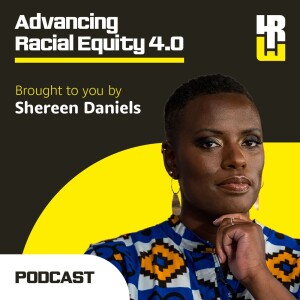
Advancing Racial Equity 4.0 with Shereen Daniels
Business:Management

22. 15 Cents on the Dollar: America's Black White Wealth Gap with Ebony Reed and Louise Story
 2024-09-11
2024-09-11
Louise Story is a prize-winning investigative journalist who spent more than 15 years at the New York Times and the Wall Street Journal, where she was the top masthead editor running coverage strategy. Her work investigating corruption led to the largest kleptocracy forfeiture in U.S. history, a scandal known as the 1MDB case. She teaches about racial wealth gaps at The Yale School of Management.
Ebony Reed is a seasoned journalism leader who has led coverage and operations with a focus on community news. Now the Chief Strategy Officer at The Marshall Project, she has held other senior roles at the Associated Press, Boston Business Journal, The Detroit News, The Cleveland Plain Dealer, and The Wall Street Journal. She’s taught at a half dozen institutions, including co-teaching with Louise at The Yale School of Management.
In this episode, I speaks with journalists Ebony and Louise about their book 15 Cents on the Dollar, which explores the Black-White wealth gap in America. The conversation covers a wide range of topics, blending personal reflections with systemic insights about racial economic disparities.
We cover:
- How Ebony and Louise connected and the origins of the book
- Personal histories and racial differences - Louise and Ebony discuss the nuances of their own family histories, such as the generational differences in wealth accumulation due to race, highlighting how systemic racial inequalities affected their fathers’ career paths and life choices.
- Wealth disparities in unexpected areas - they explore how the wealth gap shows up in places like bankruptcy, home ownership, and even auto insurance, with policies that may seem neutral but disproportionately affect Black Americans.
- Corporate responses after George Floyd’s murder - namely how many companies made public commitments to addressing racial disparities but question whether these efforts were sincere or simply self-serving.
- International parallels - I draw some comparisons between the US and the UK using the example of insurance premiums
- Personal and emotional impact - both journalists reflect on how working on the book has affected them personally, particularly how they processed their own family histories and how Ebony dealt with personal loss during the writing of the book.
About the book
A sweeping, narrative history of Black wealth and the economic discrimination embedded in America's financial system.
The early 2020s will long be known as a period of racial reflection. In the wake of the police killing of George Floyd, Americans of all backgrounds joined together in historic demonstrations in the streets, discussions in the workplace, and conversations at home about the financial gaps that remain between white and Black Americans. This deeply investigated book shows the scores of setbacks that have held the Black-white wealth gap in place--from enslavement to redlining to banking discrimination--and, ultimately, the reversals that occurred in the mid-2020s as the push for racial equity became a polarized political debate.
Fifteen Cents on the Dollar follows the lives of four Black Millennial professionals and a banking company founded with the stated mission of closing the Black-white wealth gap. That company, known as Greenwood, a reference to the historic Black Wall Street district in Tulsa, Oklahoma, generated immense excitement and hope among people looking for new ways of business that might lead to greater equity. But the twists and turns of Greenwood's journey also raise tough questions about what equality really means.
Seasoned journalist-academics Louise Story and Ebony Reed present a nuanced portrait of Greenwood's founders--the entertainment executive Ryan Glover; the Grammy-winning rapper Michael Render, better known as Killer Mike; and the Civil Rights leader and two-term Atlanta mayor, Andrew Young--along with new revelations about their lives, careers, and families going back to the Civil War. Equally engaging are the stories of the lesser-known individuals--a female tech employee from rural North Carolina trying to make it in a big city; a rising leader at the NAACP whose father is in prison; an owner of a BBQ stand in Atlanta fighting to keep his home; and a Black man in a biracial marriage grappling with his roots when his father is shot by the police.
In chronicling these staggering injustices, Fifteen Cents on the Dollar shows why so little progress has been made on the wealth gap and provides insights Americans should consider if they want lasting change.
Subscribe/follow on all major podcast platforms including Apple, Spotify and Audible, for more bi-weekly insightful conversations and if you feel compelled, leave us a comment as I appreciate all feedback!
More Episodes
 2024-05-02
2024-05-02
 2022-01-10
2022-01-10
 2021-07-16
2021-07-16
 2021-06-18
2021-06-18
 2021-05-21
2021-05-21
Create your
podcast in
minutes
- Full-featured podcast site
- Unlimited storage and bandwidth
- Comprehensive podcast stats
- Distribute to Apple Podcasts, Spotify, and more
- Make money with your podcast
It is Free
- Privacy Policy
- Cookie Policy
- Terms of Use
- Consent Preferences
- Copyright © 2015-2024 Podbean.com




